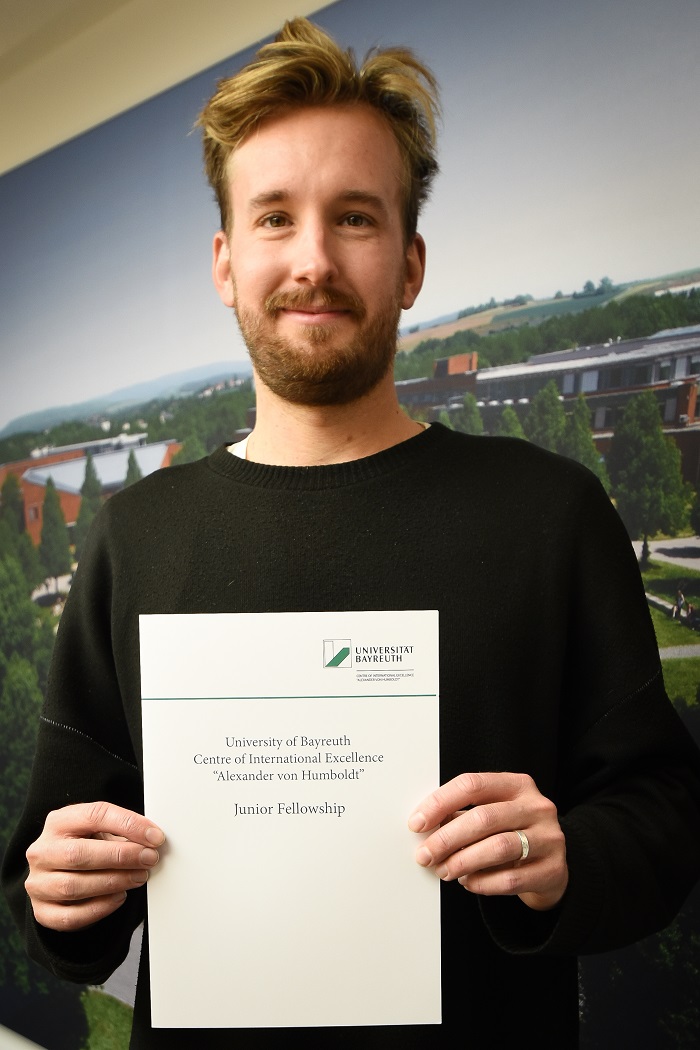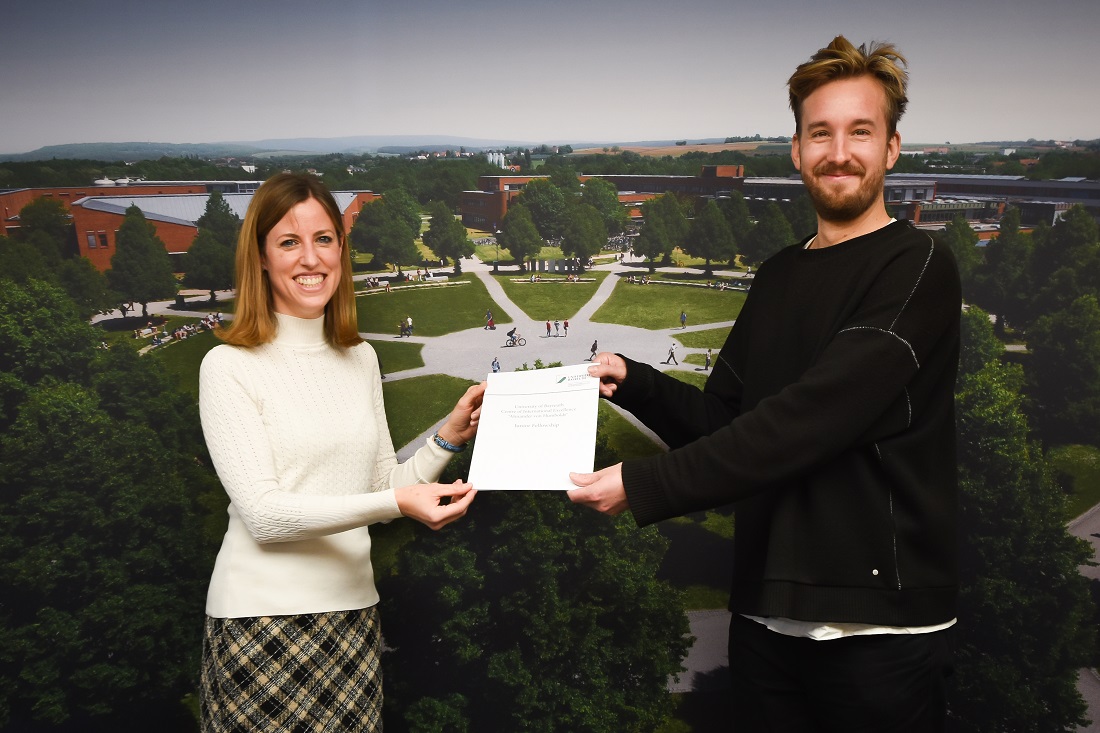Meet the Fellow: Justin Begley
Botany Before Linnaeus: Poetry and Scholarship in the Res publica Botanica, c. 1660-1740
Thanks to their shared interest in early modern scientific knowledge, Dr. Justin Begley and his host, Professor Florian Klaeger, fully capitalised on Begley’s stay at UBT to initiate a considerable number of activities. The beginning of a promising collaboration!

What are the foci of your joint research funded by the Fellowship?
Justin Begley: Professor Klaeger and I have joint research foci on the poetics of scientific knowledge and the applicability of scientific analogies across kingdoms and 'cosms' (the microcosm and macrocosm) in different textual forms during the early modern period. We have discussed these issues in detail during my fellowship. Our conversations have helped to shape two major articles that I am in the late stages of producing. We have also organised a workshop that will bring together researchers at the University of Bayreuth. In addition, we have begun planning an international conference on 'Forms of Knowledge in Early Modern Science' that will allow us to refine our joint research programme in light of related literary and historical agendas. Our shared methodology - namely, the interpretation of early modern scientific texts within their literary, stylistic, and linguistic contexts - will be honed through this conference. The event will also help us to circumscribe our subject area further, and we have discussed applications for several joint research grants so as to continue our collaboration in the years to come.
In what way is your work interdisciplinary, and what does interdisciplinarity mean to you inacademic work and life?
The University of Bayreuth is home to an array of scholars working on the histories of science, knowledge, and literature. Capitalising on a shared interest in early modern scientific knowledge, the aim of Professor Klaeger's and my collaboration has been to initiate a dialogue about how scientific investigations interacted with poetics at a pivotal moment in the histories of both. This makes it an inherently interdisciplinary project, irreducible to the histories of either one discipline. Rather, our research seeks to make sense of past investigations of nature--indeed of historical advances in understandings of the functions of substances including the elements and of living beings--in terms of the language, concepts, literary modes, and imaginative frameworks available to our actors. Having worked consistently at the intersection of literature/philology and history, interdisciplinarity is integral to my approach. Interpreting texts within their cultural, social, and intellectual contexts, for me, necessarily means striving to understand the various bodies of knowledge from which they emerged, whether they be fundamentally biological, astronomical, technical, or poetic in nature.

Junior Fellow Justin Begley and Susanne Lopez Enriquez, Managing Director of the Bayreuth Humboldt Centre
What is in your opinion the future of your field? In what way can research in your field contribute to meeting the urgent challenges of our time?
Research into the history and poetics of scientific knowledge has, I believe, a very exciting future. This is chiefly because, in our present moment, understanding the ways in which scientific ideas and findings are selected and conveyed to non-specialist audiences is particularly essential. Universities, governments, and companies are all likely to benefit from such historical work as they strive to overcome the challenge of specialisation, on the one hand, and of the reification (and thus the misapplication) of scientific knowledge, on the other.
I believe that the history of botanical poetics will have an equally rich future because of a revived popular concern with the functions and uses of plants. This present-day fascination with the vegetal is not only inspired by the possible medicinal value of plants, especially when it comes to treating psychological illnesses, but also by a sense that much of what we can learn about them will have consequences for understanding networks, communication, and even consciousness, and thus the human/AI distinction. Going well beyond taxonomy, my work draws attention to the little-known history of speculative approaches to botany.
What does international research mobility mean to you?
Having worked at universities in two continents and six countries, mobility has been an essential component of my academic career. The challenges of the past two years, since the emergence of Covid-19, have been considerable, preventing travel for international conferences, reducing networking and funding possibilities, and slowing down essential archival work. The general shrinking of the global landscape has resulted in the closing of doors for many, especially younger and less established scholars. The academic possibilities in 2021 seem far removed from those in 2019. Then again, thanks to the commitment of institutions such as the University of Bayreuth to funding collaborative research, new and exciting connections have emerged, as in my case. I greatly hope that possibilities for international mobility continue to re-emerge, since I am convinced that in-person conferences and symposia, and the informal collaborations that so often ensue from them, are essential to academic innovation.
How did the current challenges influence your cooperation?
The current challenges have limited possibilities for networking. Highly curated Zoom conversations are hardly a replacement for the social encounters that typically occur at and follow from conferences. Although it has been possible to have exchanges digitally, extra pressures on scholars in terms of child-care commitments and the need to adapt to online teaching have meant that few had as much time as they would have liked for extra-professional activities. It has also been difficult to expand (or even maintain) one's networks. Campus life has been impacted by testing and mask wearing requirements, but it's great that students are able to learn in person again. Because my own research is grounded in manuscript material--very little (if any) of which has been digitalised--I have benefited minimally from digitalisation efforts beyond accessing secondary sources. My archival work this year has been hampered by limited time slots and pre-booking requirements in the archives. But this was not an issue at the University of Bayreuth, where I have had access to a nice office and where my host, Professor Klaeger, has ensured that I've had a really fantastic and productive stay.
The Fellow:
Justin Begley is a scholar of early modern intellectual history. Having received his DPhil from the University of Oxford, he has held research fellowships at the University of Helsinki, the Folger Shakespeare Library, the University of Bucharest, the Herzog August Bibliothek, and the Gotha Research Centre, before coming to the University of Bayreuth. Justin has a book forthcoming with Palgrave Macmillan, and another submitted to OUP, and has published in journals including Intellectual History Review, Annals of Science, The Review of English Studies, and Perspectives on Science. His research explores the intersections of literature, science, and philosophy during the mid-late seventeenth and early eighteenth century. He has a particular interest in what was thought to separate humans from animals and plants at this time. His current research concerns pre-Linnaean botany. It seeks to explain how botany became detached from medicine between 1660 and 1760, paying particular attention to the experimental, literary, and conceptual methods and frameworks that botanists used to represent the vegetal at this time. Justin has just begun a Humboldt fellowship at Ludwig Maximilian Universität, München.
